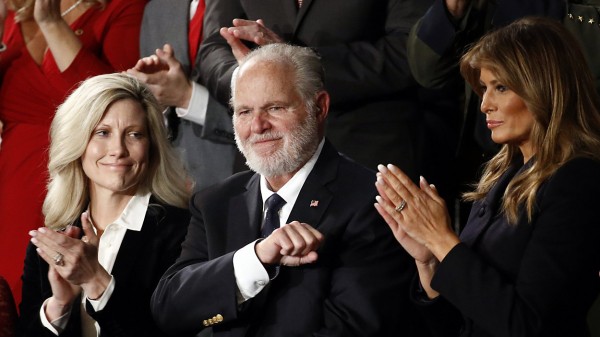Talk radio pioneer and political provocateur Rush Limbaugh died following a battle with lung cancer. Limbaugh was 70 years old.
Limbaugh was known for his conservative political commentary, which at times proved controversial. He was an early and ardent supporter of former President Donald Trump, who would award him with the Presidential Medal of Freedom in 2020.
“As a college student in the 1980’s, I started listening to Rush Limbaugh’s humorous conversations about our American values like hard work, the value of every person and freedom of opportunity and belief,” Senator James Lankford, R-Oklahoma, said in a post on Facebook. “[Limbaugh] was a true pioneer in the media. He proved he would not be intimidated into silence as he voiced the thoughts of millions of people in our nation and free people around the world. His clear voice for Conservative values will be missed in our American dialogue.”
Limbaugh was often referred to as the “voice of conservatism.” He dropped out of college to pursue a career in radio.
Initially a disk jockey, Limbaugh was fired from multiple stations before finding his voice in talk radio. His show didn’t take off until the repeal of the “Fairness Doctrine,” an FCC policy that required broadcast license holders to present both sides of controversial issues in an honest, equitable, and balanced manner.
With the repeal of the policy, Limbaugh proclaimed he was free of liberal domination. He signed on with WABC in New York in July 1988 and launched his conservative empire just before the 1988 Republican National Convention.
In December 1989, The New York Times wrote that “Limbaugh has more listeners than any other talk show host.” and described his style as “Bouncing between earnest lecturer and political vaudevillian.”
In 1992 Limbaugh’s political monologues targeted the Democratic nominee for President, Bill Clinton. Former President Clinton would go on to blame talk radio for the Oklahoma City Bombing. He later clarified his comments were directed not at Limbaugh but rather at ameautur radio operators.
Limbaugh began losing his hearing in the early 2000s, but continued to do his daily talk show with the use of cochlear implants.
In 2003, Limbaugh began a brief stint as a football commentator on ESPN. This position was short lived due to controversial comments and Limbaugh’s admission to an addition to prescription drugs.
Limbaugh sought treatment for his addiction in 2006 when he turned himself into the authorities. His record was cleared of first-degree prescription fraud leaving it clean.
The talk radio host announced his Stage 4 lung cancer diagnosis in 2020 and continued with treatments while regularly hosting his nationwide talk show.

